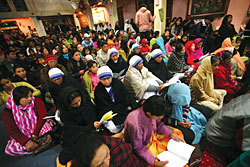 KIRAN PANDAY |
Christmas Day is itself a public holiday now, and well we might wonder why. In the erstwhile Hindu kingdom of Nepal, we now celebrate - or are given license to celebrate - everything from the more conventionally Hindu and Buddhist specials to Id, a clutch of Lhosars and more secular attractions such as Republic Day, Labor Day and Martyrs' Day. And Christmas. In the Kathmandu Valley, it may seem that the spirit of inclusion that has gripped Naya Nepal may even have the expat community in its drunken embrace, for what else but the latter's patronage and the economic imperative could give momentum to this particular season of making merry?
Delve a little further, however, and you will understand that in Nepal, Christmas isn't just about the glitzy ballrooms of the Hyatt and the Soaltee. Even recent tragedies point to the changing demographics of this country. In May, a bomb killed two in a church in Dhobighat. In September, at least 23 people gathered for a Christian conference of 1500 were killed when a makeshift church dormitory collapsed in Dharan. Walk past Patan Darbar Square these days and you are as likely to catch a riveting performance of the Kartik Nach, the re-enactment of Narasimha's disembowelment of the demon Hiranyakashyap, as a re-enactment of the Passion of the Christ. Walk into Ekta Books looking for some godly inspiration, and you're more likely to come across rack upon rack of Christian Lit than anything else. This, in a nation where Christian proselytisation is still frowned upon despite the 1990 Constitution's provisions for religious freedom, and where the 1971 census determined a Christian population of just 2541.
Today, these numbers have mushroomed to upwards of half a million, by some accounts. According to the Nepal Research and Resource Network, there were 2799 churches in Nepal in 2007, 309 in the Kathmandu Valley alone. We may not quite be making the Great Leap Forward, but Christianity has made great strides in Nepal, and we have one of the fastest growing Christian populations in the world.
What of it? I have always had a problem having religion foisted on me, be it through the medium of all-night megaphoned bhajans or clean-scrubbed Jehovah's witnesses a-knocking on my doorstep. But as long as I don't have to hear it or don't see the ill consequences of it, I don't care what religion rocks your boat, it's all Greek to me. What is striking, however, is the remarkable growth of the Gospel in a society traditionally bound by Hindu or Buddhist conventions. This speaks volumes about that society's failure to address the spiritual needs of its members. The cynics or diehards among us may allege that Christian missionaries offer financial inducements to lure marginalised Dalits and janjatis away from their 'real' religious roots, regardless of how recent conversions to Vedic Hinduism itself might be. But the fact remains - state and society have failed these people in some way, and Christianity is offering them something tradition has been unable to.
So rather than perceive the growth of Christianity as a threat (read: editorials in 2011 that express surprise, no, shock, at the new census figures), perhaps it should be seen as a wake-up call. Not to imagine that we can turn the clock back, that this would be even desirable, but to consider how, beyond economics, we can accommodate the hundreds of thousands of Christian Nepalis and others who are so disenchanted with Nepali spirituality. That, rather than a turkey dinner, might be food for thought this Christmas. For those who have the means, after all, 'tis the season to be merry, like any other.



